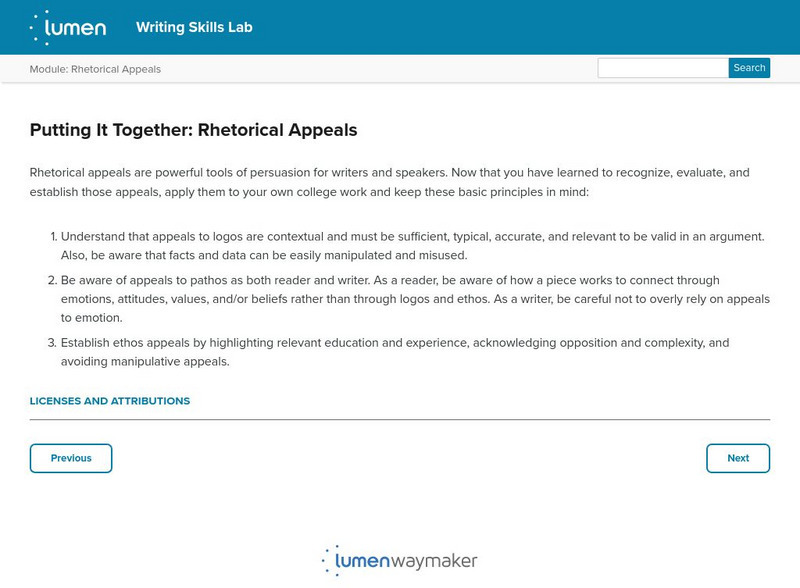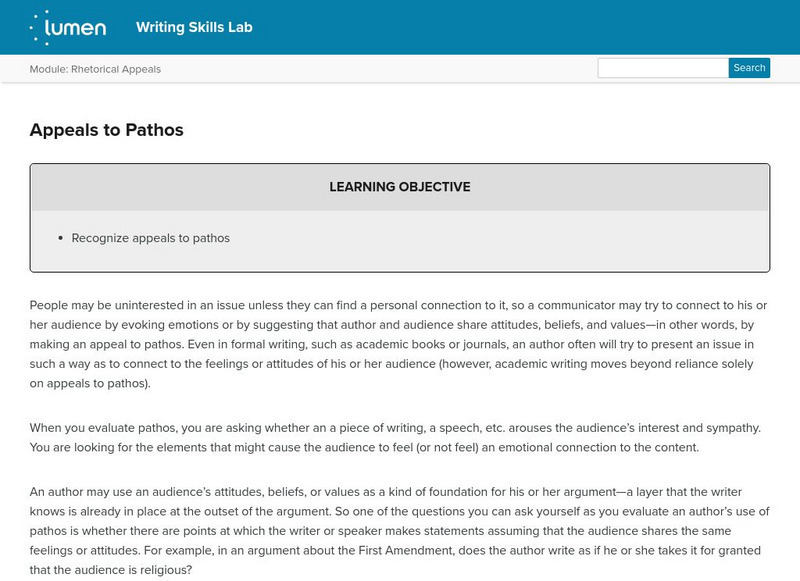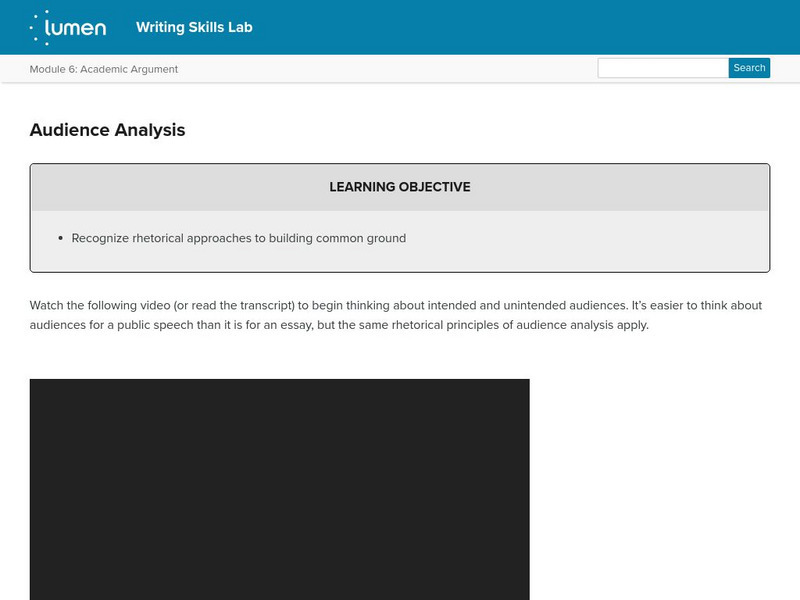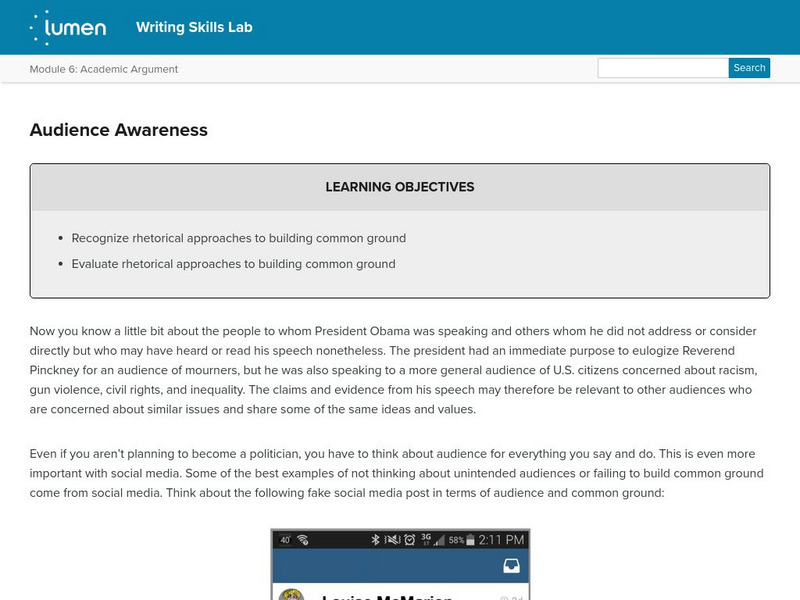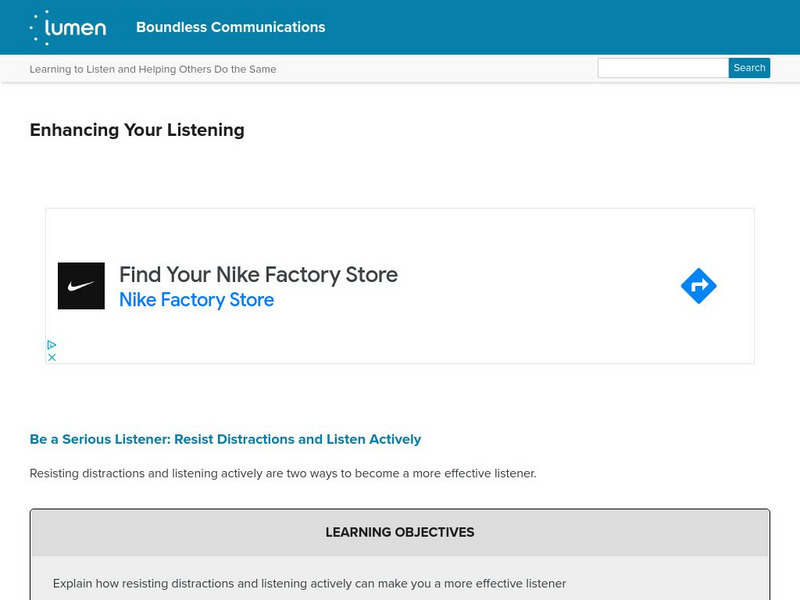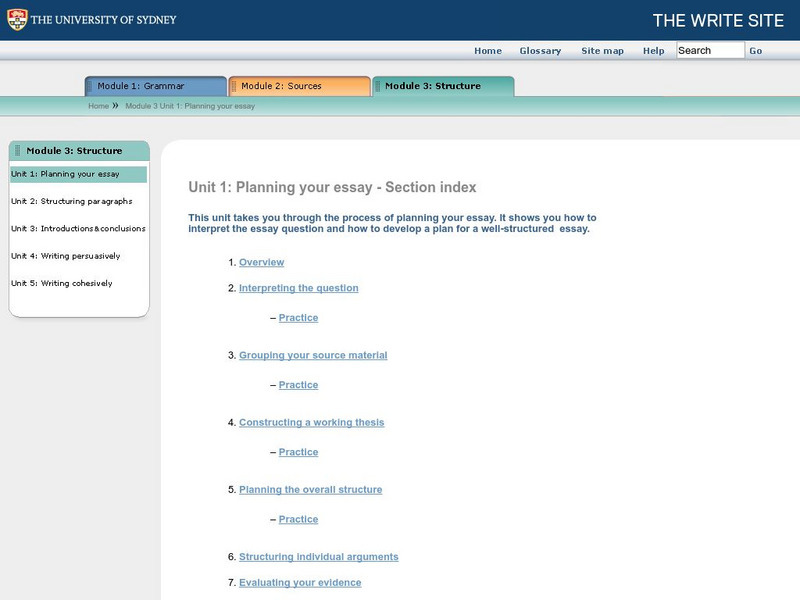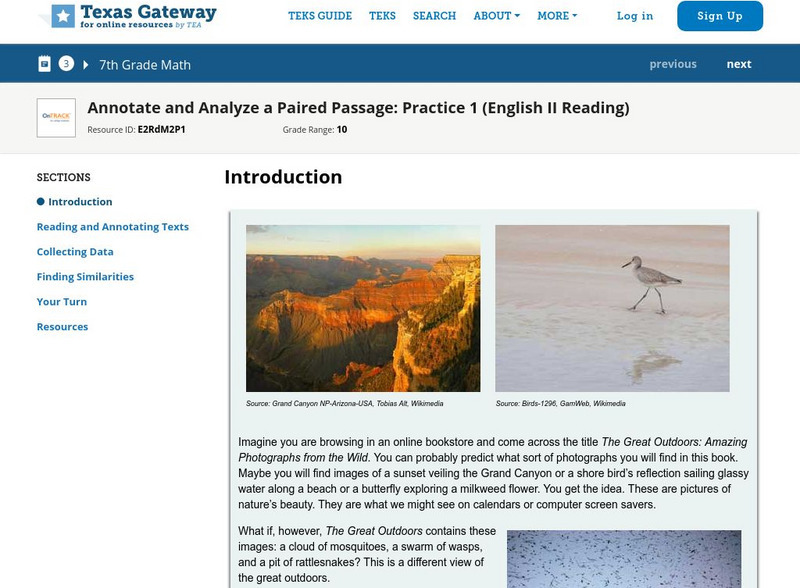Lumen Learning
Lumen: Rhetorical Appeals: Kairos and Logos
This lesson focuses on the 4th logical appeal called Kairos, a time when conditions are right for the accomplishment of a crucial action; the opportune and decisive moment.
Lumen Learning
Lumen: Academic Argument: Practice: Argumentative Thesis Statements
This practice exercise focuses on recognizing and evaluating argumentative thesis statements.
Lumen Learning
Lumen: Putting It Together: Rhetorical Appeals
This lesson brings together the rhetorical appeals including Logos, Pathos, and Ethos and how to identify and apply each. Click the Next link for more information.
Lumen Learning
Lumen: Analysis: Suspend Judgment
This article focuses on the need to suspend judgment and keep an open mind while analyzing a situation or researching a topic.
Lumen Learning
Lumen: Rhetorical Appeals: Appeals to Pathos
This lesson focuses on appeals to pathos; to connect to the audience by evoking emotions or by suggesting that author and audience share attitudes, beliefs, and values.
Lumen Learning
Lumen: Writing Skills: Audience Analysis
This lesson focuses on audience analysis and recognizing rhetorical approaches to building common ground. A practice activity is provided.
Lumen Learning
Lumen: Writing Skills: Audience Awareness
This lesson focuses on audience awareness by recognizing and evaluating rhetorical approaches to building common ground. It also provides an example.
Lumen Learning
Lumen: Writing Skills: Tone, Language, and Appeal
This lesson plan focuses on using tone, language, and appeal to recognize and evaluate rhetorical approaches to building common ground. RI.9-10.4 word meanings/impact of choice
Lumen Learning
Lumen: Critical Reading: Logic and Structure
This instructional activity focuses on structure and logic including types and purposes of essays, organizational patterns, argumentative writing, and logic and fallacies.
Lumen Learning
Lumen: Multimodality: The Five Modes of Communication
This lesson focuses on the five modes of communication: visual, linguistic, spatial, aural, and gestural along with examples of each.
Lumen Learning
Lumen: Examples of Multimodal Texts
This lesson focuses on providing examples of multimodal texts, those using more than one mode of communication in the same text.
Lumen Learning
Lumen: Boundless Communications: Enhancing Your Listening
In this Boundless Communication students will learn the importance of being an active listener who can resist distractions and keep an open mind while suspending judgment and exercising empathy. SL.9-10.3 Eval Presentation, SL.9-10.3...
Lumen Learning
Lumen: Boundless Communications: Contextual Factors to Consider
In this Boundless Communication presentation, students will learn about contexts to consider when preparing a speech including physical, the psychology of audience, audience opinion of you and topic, and audience knowledge of the topic.
Lumen Learning
Lumen: Boundless Communications: Outlining
This website focuses on students the importance of having of outlining; it offers links to the discussion of four outlining concepts: Reasons for outlining, the Preparation outline, the Speaking outline, and the Rough Draft outline.
University of Victoria (Canada)
Uvcs: Critical Reading Exercise
Students read quotations from different "interest groups" or "lobbies" in this exercise and then perform a multiple-choice test to evaluate the credibility of each lobby group.
Wisc-Online
Wisc Online: Intercultural Communication: Gestures
In this learning module, students will recognize common gestures and identify the meanings associated with those gestures.
Other
Ncsall: Relationship Between Reading and Speaking
The interview discusses the relationship between reading and speaking.
Texas Education Agency
Texas Gateway: Literary Text: Close Reading of Prose: Practice 2
This activity focuses on close reading, the careful, sustained reading of a text. One strategy to help you read closely is to ask yourself questions such as What is your overall impression of the passage? What mood does the passage...
Texas Education Agency
Texas Gateway: Informational Text: Analyze an Argument: Practice 1
When you read an argumentative essay or article, you should analyze the author's evidence. However, you can't analyze the evidence a writer gives in support of a position if you don't know the author's perspective.
University of Sydney (Australia)
University of Sydney: Module 3 Unit 1: Planning Your Essay
This unit index contains links with to guide students through the process of planning a multi-paragraph argumentative essay. Students will learn how to interpret the essay question, develop a writing plan, thesis, writing the argument,...
Texas Education Agency
Texas Gateway: Teaching Expository & Persuasive Texts: Writing Expository Essays
In an expository essay, a type of informational text, the writer clarifies or explains something by using facts, details, and examples in a clear and concise way. To write an effective expository essay, students need a basic...
Texas Education Agency
Texas Gateway: Literary Text: Diction and Tone
This lesson deals primarily with diction and tone and how to recognize them in your reading. Tone is largely determined by diction or the word choices a writer makes. The process of choosing the right word involves denotation and...
Texas Education Agency
Texas Gateway: Annotate and Analyze a Paired Passage: Practice 1
In this lesson, you will read and annotate a pair of texts to make inferences, draw conclusions, and synthesize ideas and details using textual evidence. Prepare to get involved in a conversation between you and the two texts you will be...
Texas Education Agency
Texas Gateway: Rhetorical Devices and Transitions (English I Writing)
[Accessible by TX Educators. Free Registration/Login Required] In this lesson, you will learn about Sam's three tricks: parallel structure, the rhetorical question, and transitional words and phrases.




